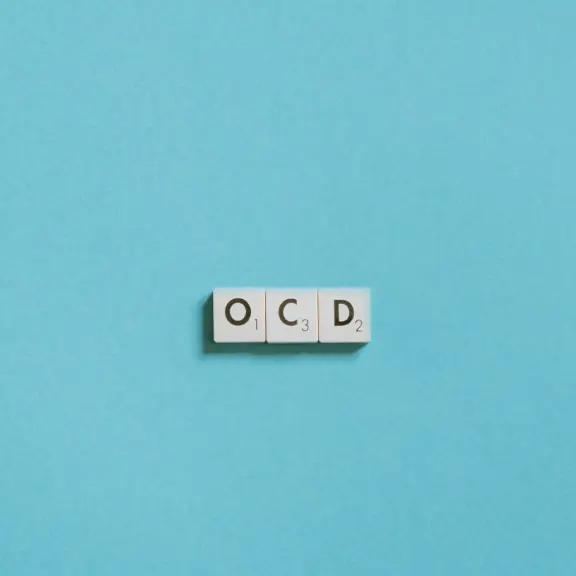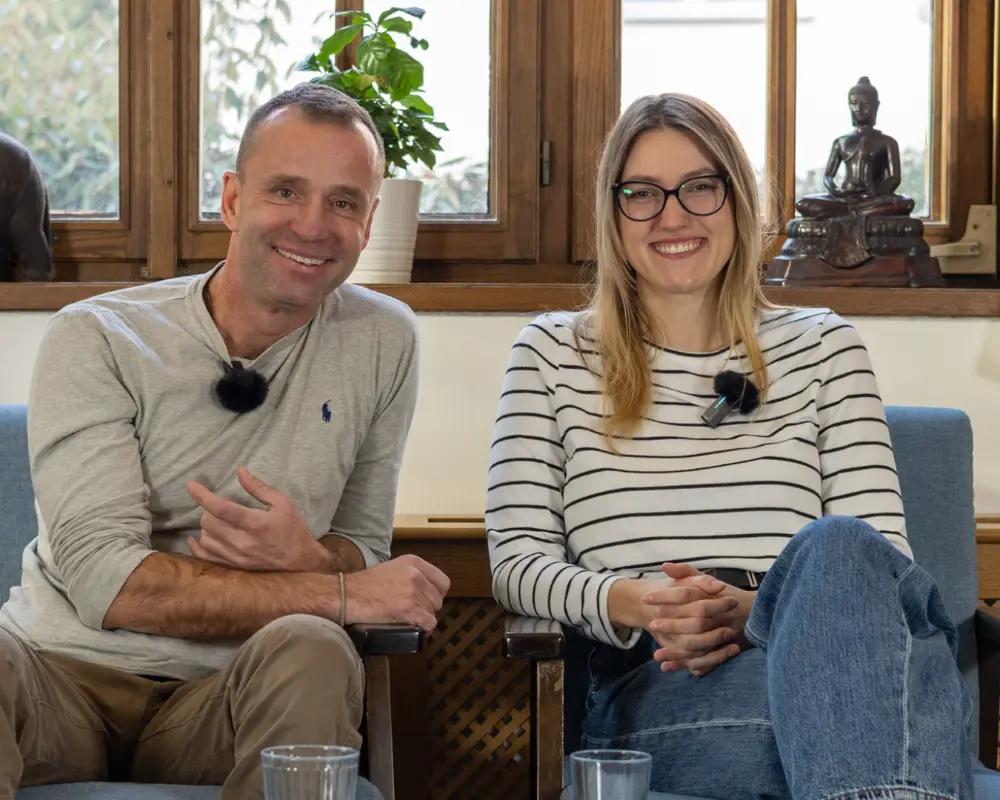“Now I have to get the carrots out of the bag in the fridge to make the soup. Before I open the fridge, I have to tap 3 times on the right corner of the door towards the window. That third tap wasn't finished exactly. I have to do it again, but so that nothing happens, 3 times more (nine taps). There are 7 carrots, I have to take one. But I don't know which one to choose. I can't decide because, what if I don't make the right decision? Once I take one out, I can't take it back. It's going to be bad and something could happen. I am afraid that something bad will happen, for example something with Leuška. Now I didn't tap right, it wasn't exactly on the right corner. I have to knock again. And I have to do it right. So I need 3 times more (27). What if I don't do it right now? What if it fails again? Then I can't open the fridge. Matouš forgot and did not take the carrot out of the bag. If he took it out of the fridge, I wouldn't have to make a decision. Because I can make the wrong decision. And then something bad could happen. What time is it? I can't cook it anymore. Again, I can't do anything at all. I am completely incapacitated! No good! I can't even handle a stupid lunch! I always ruin everything!”
And Rebekah collapsed on the kitchen floor in anguish and intense tension, crying with exhaustion and feeling "lost" in time in the vicious circle of obsessive-compulsive disorder (OCD).
Who is Rebecca? And what does the opening quote represent? Rebeka is a young, married mother of a 2-year-old child who has been diagnosed with OCD. The opening excerpt presents her manifestations (symptoms) of OCD in thought and behavior.
According to the DSM-5-TR (Diagnostic and Statistical Manual of Mental Disorders), the essential feature of OCD is recurrent intrusive thoughts – obsessions or compulsive acts – compulsions. Obsessions are ideas, impulses that force themselves into the mind, usually cause anxiety and the individual tries to suppress, ignore or neutralize them with actions - i.e. perform compulsions. Compulsions refer to stereotypically repetitive behaviors (washing hands, straightening, checking things) or mental processes (eg, praying, counting, silently repeating words) that the individual feels compelled to perform according to rules that must be strictly followed. The behavior is aimed at preventing or alleviating anxiety or preventing the feared event, but the behavior is not realistically connected to what it is intended to prevent or is significantly exaggerated. OCD is one of the anxiety disorders, with a usual onset in childhood, and the personality (before the illness) often has pronounced anankastic features (excessive meticulousness "punctuality"). A contributing risk factor is a stressful event.

Before we proceed from Rebecca's OCD described manifestation and then elaborate on it, let's say a few words about the beginnings of the disease. Rebeka remembers the first time she noticed OCD in the 4th grade, when she clearly remembers being exhausted and tired while writing homework. She described herself as overly meticulous and repeatedly rewrote the assignment from the beginning (a comma wrong and the entire assignment again). Repeated rewriting stretched into the late hours, and with each rewriting increased anxiety that she would not complete the assignment because she "can't write it right." Correct means that the task will not contain any strikethroughs - thus a fixed error. And at the same time, with each "bad" writing, her belief in herself "that she is incapable" grew and "strengthened".
And now let's go back to the kitchen to prepare lunch. Here we can see the rituals that the patient has associated with performing a certain activity. She "has" to do these rituals so that nothing bad happens and she has to do them "accurately" (she creates everything herself). Specifically, Rebeka has a ritual of counting (compulsion) associated with knocking and going through rituals "she wants to protect" (an intrusive thought-obsession about illness anxiety) her little daughter from possible illness, so that nothing happens to her (the daughter is healthy). If Rebeka doesn't tap "correctly", she has to do it again, but she is penalized for the mistake (she gives the punishment herself). He must tap 3 times more to cure and avert the "potential threat" (disease). Along with the OCD symptom (manifestation) of counting, significant indecisiveness and slowness are associated - (there are 7 carrots in the bag and he has difficulty deciding on one, because he has to make the "correct" decision). As the ritual progresses and its increasing repetitions, distress and anxiety clearly grow with it (she wants to get it over with, but correctly, so that she can continue - cooking). The idea of the next action – the decision to choose a carrot – is difficult, as Rebeka experiences an increasingly intense feeling that she will not be able to manage her intention – to open the fridge. She is already strongly doubted (her self-doubts are increasing), she "confirms" her inability to cook and abandons the intention of cooking due to exhaustion - she fails. Rebeka usually tries to help herself by having her husband do some of the work - he pulls out the carrot. However, Matouš doesn't help Rebeca with that. Why? Because by performing these activities for her, he creates and supports Rebekah's dependence on him. Rebeka "gets into the position of a victim of the disease" who needs help - "when I put myself in the role of a victim, I don't have to make a decision". As dependence on Matouš grows, Rebekah's ability to cope on her own decreases. Our story continues with the expansion of OCD by involving the husband in the ritual. What is it? Matouš performs a ritual - he knocks for her. He wants to relieve her, because he perceives her relief from tension and reduction of anxiety, which happens temporarily after the "successful" completion of the ritual. However, before the next activity, the ritual process together with anxiety occurs again. By involving the other in OCD, the latter also comes under great pressure. Rebecca's other OCD symptoms, where she counts, taps and experiences significant indecisiveness, include: getting dressed, crossing thresholds, operating electrical appliances.
"My husband has taken over most of the things because I can't finish anything. It takes too long, I'd rather avoid it. By not doing things, I am not living. How is it possible that I have to do OCD when I know, for example, when talking to you, that it is nonsense to knock! But then it comes and I can't control it, no matter how hard I try. I feel like I don't want to, but I just follow in anxiety and I'm controlled! And sometimes I delay tapping, but then it accumulates multiple times and I have to tap even longer! I am completely helpless, I can't decide anything! OCD is ruining my life!”
Treatment includes psychotherapy, often combined with medication. In psychotherapy, the client learns to help himself in crisis situations, at the same time he learns to understand and deal with his disorder, thereby experiencing relief. Next, find tools that help him control his behavior.
The names in the story and the story itself are made up. I respectfully thank my clients for allowing me to describe their thoughts.
BE IN THE IMAGE
Information, articles and news
Do you need help?
You can send us a message or call us every day from 8 a.m. to 8 p.m. +420 228 226 101
This website is using cookies
You can either allow them all with the "I agree to all" button below, refuse or set the "Detailed settings" in detail. You can also change the selection later. More information about cookies in the Cookie Policy .




